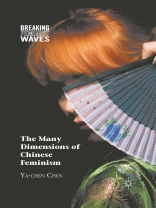In the current English-language publication market, this book is one of the earliest academic monographs to comparatively investigate different feminist scholars and academic feminism across the Taiwan Strait. It problematizes recent scholarly understanding of feminist complexity in various Chinese-speaking areas. This book addresses sociocultural backgrounds of how Mainland Chinese, Taiwanese, and Hong Kong feminist scholars strategize their transfers, localization, and acculturation of Western feminist literary theories. It emphasizes how Chinese literary theorists filter, gate-keep, select, import latest Western feminist theories, and then match them with local socio-cultural trends by exerting comparative researchers’ cross-cultural and cross-lingual academic power in order to tackle Mainland China’s, Taiwan’s, and Hong Kong’s own gender problems.
Inhoudsopgave
This Chinese Feminism Which Is Not ‘One’ More Than Three Waves of Feminism Taiwanese Academy’s Reception of Feminist Scholars and Academic Feminism: Interviews about the 1990s The Academy’s Reception of Feminist Scholars and Academic Feminism in the PRC: Interviews about the 1990s French Feminist Theories in Zhongwai wenxue of the 1990s French Feminist Theories in Wenyi lilun of the 1990s Feminist Orientalism and Occidentalism: Feminist Theoretical Round-Trips, Feedback Loops and ‘Not-one-ness’
Over de auteur
YA-CHEN Chen’s academic interests include Sino-Western comparative literature, Asian Studies, women’s and gender studies, (multi)cultural studies, and film studies. Cited as an emergent diversity scholar by the National Center of Institutional Diversity (NCID) at University of Michigan in Ann Arbor (2010), Ya-chen Chen is the recipient of
Fu Cheng Literary Award (1995), CCA (Council for Cultural Affairs) Modern Literary Research Award (1997-8), Lynn Interdisciplinary Research Fellowship in Women’s and Gender Studies (2001-2005), Faculty Fellowship Publication Program (FFPP) Grant (2009), William Stuart Research Award (2009), and Taiwan Studies Research Travel Grant (the first and so far the only Chinese-heritage winner, 2010). She published
Farewell My Concubine: Same-Sex Readings and Cross-Cultural Dialogues (2004),
Women in Taiwan: Sociocultural Perspectives (2009), and
Higher Education in East Asia: Neoliberalism and the Professoriate (2009). Her academic articles appear in
American Journal of Chinese Studies,
Borrowers and Lenders: Journal of Shakespeare and Appropriation,
Asian Cinema,
Mediascape: Journal of Cinema and Media Studies,
Feminism/o,
Dangdai (
Con-Temporary), and
Shijie dianying (
World Cinema), etc. Most of them are also included in Ohio State University’s MCLC (Modern Chinese Literature and Culture) on-line resource center.












